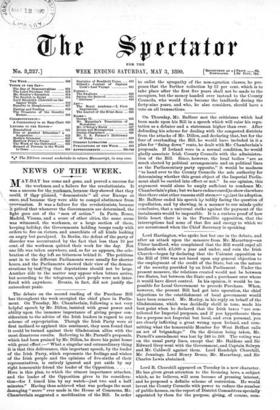The debate on the second reading of the Purchase Bill
has throughout the week occupied the chief place in Parlia- ment. On Tuesday, Mr. Chamberlain, following a not very helpful speech by Mr. Dillon, insisted with great power and ability upon the immense' importance of giving proper con- sideration to the advice of the Irish leaders in regard to any scheme of expropriation. Though the Irish Party were at first inclined to applaud this sentiment, they soon found that it could be -turned against their Gladatonian allies with the most disastrous results. Referring to Mr. Parnell's proposals, which had been praised by Mr. Dillon, he drove his point home with great effect :—" What a singular and extraordinary thing it is that this deliverance, this important speech, by the leader of the Irish Party, which represents the feelings and wishes of the Irish people and the opinions of five-sixths of their representatives, is entirely ignored and put aside by my right honourable friend the leader of the Opposition Here is this plan, to which the utmost importance attaches, and the leader of the Opposition gives to its considera- tion—for I timed him by my watch—just two and a half minutes." Having thus achieved what was perhaps the most damaging " score " ever made in the House of Commons, Mr. Chamberlain suggested a modification of the Bill. In order
to enlist the sympathy of the non-agrarian classes, he pro- poses that the further reduction by 12 per cent. which is to take place after the first five years shall not be made to the occupiers, but the money handed over instead to the County Councils, who would thus become the landlords during the forty-nine years, and who, he also considers, should have a veto on all transactions.






































